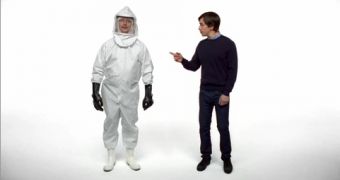Apple has started airing new “Get a Mac” ads featuring the same protagonists, as well as the same topics – PC's ongoing struggles with viruses and Windows' lack of user friendliness. In spite of Microsoft's constantly changing ad campaigns, Apple sticks to its ever-more-sarcastic ads, whose impact will undoubtedly be felt.
The four new ads (Time Traveler, Stacks, Legal Copy, Biohazard Suit) are, by far, cooler than Microsoft's still awkward ad campaign, “cool” also being the term used by Apple's spokesperson, Bill Evans, when describing the Macintosh and what it stands for.
“A PC is no bargain when it doesn't do what you want,” Apple's spokesman told BusinessWeek, answering a question about Microsoft's latest PC ads. “The one thing that both Apple and Microsoft can agree on is that everyone thinks the Mac is cool. With its great designs and advanced software, nothing matches it at any price,” Bill Evans stated.
Out of the four ads, Time Traveler seems to resonate best with reality – Windows has always seemed to remain what it is (looking at the stability and reliability of the OS), despite ongoing promises of better times coming from Microsoft.
Remarks made by Kevin Turner, chief operating officer for Microsoft, recently revealed that, “Vista today, post-Service Pack 2, which is now in the marketplace, is the safest, most reliable OS we've ever built. It's also the most secure OS on the planet, including Linux and open source and Apple Leopard,” Turner said at the MidMarket CIO Summit held in Redmond, Washington. “It's the safest and most secure OS on the planet today,” he emphasized.
Apple doesn't seem to have taken Turner's statements seriously in the “Biohazard Suit” ad, which portrays PC as wearing a suit that protects him from malware targeting PCs. Still, Symantec researchers Mario Ballano Barcena and Alfredo Pesoli have recently reported the discovery of the first ever Mac OS X botnet. The malware is actually spread through two trojans that have already been patched.
Readers can visit Apple here to view the company's latest “Get a Mac” ads.

 14 DAY TRIAL //
14 DAY TRIAL //